Bakeries are entering 2019 with many of the previous year’s challenges closely tailing them. The widening workforce gap and shifting consumer preferences are forcing companies to examine pressing issues and create roadmaps for success.
To help bakers navigate the year ahead, Baking & Snack asked 13 industry professionals one question: When improving operations in 2019, what should bakeries prioritize? Responses are listed alphabetically by company.
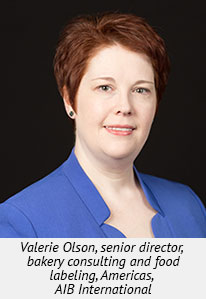 Valerie Olson, senior director, bakery consulting and food labeling, Americas, AIB International: Considering the many challenges in bakery operations, there are three areas for prioritization in 2019.
Valerie Olson, senior director, bakery consulting and food labeling, Americas, AIB International: Considering the many challenges in bakery operations, there are three areas for prioritization in 2019.
Overcoming the skills gap: As a larger percentage of employees require additional on-the-job training, managing for this gap will require upskilling new hires quickly. Sourcing virtual, online and on-demand training from reliable sources provides accessible training options for all employees.
Compliance with the Food Safety Modernization Act (FSMA) and the Food and Drug Administration (F.D.A.) requirements: Two FSMA compliance dates in 2019 are pertinent for bakeries and snack food manufacturers: The Mitigation Strategies to Protect Against Intentional Adulteration, deadline on July 26, for most businesses and the Foreign Supplier Verification deadline on March 18, for small businesses.
Separately, the F.D.A. Food Labeling Guidelines revisions are finalized on Jan. 1, 2020, for large businesses. These updates will impact all food products and require the revision of food labeling components in early 2019 to meet the compliance date. Compliance with these programs also will require investments in training.
Product transparency and sustainability: As consumer demand for transparency and social accountability grows, so does its influence on food manufacturers. One area expected to surge is the demand for products made with sustainable palm oil. To date, there are 164 sites in the United States that are Roundtable on Sustainable Palm Oil certified, and many of them are in the bakery and snack food sectors.
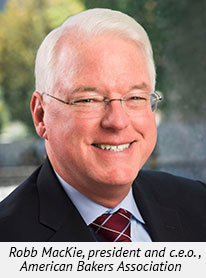 Robb MacKie, president and c.e.o., American Bakers Association: Profitable and effective operations are a direct byproduct of the people running them. Therefore, we believe workforce development is a key initiative that bakeries should consider in 2019 to improve or grow their business. Everyone likes to talk about technological resources, but we believe human resources are key to business development. Whether it’s growing your next generation of business leaders, training new employees to learn all aspects of the baking process or encouraging the potential of your front-line leaders, education and training are necessary investments in order to succeed in 2019 and beyond.
Robb MacKie, president and c.e.o., American Bakers Association: Profitable and effective operations are a direct byproduct of the people running them. Therefore, we believe workforce development is a key initiative that bakeries should consider in 2019 to improve or grow their business. Everyone likes to talk about technological resources, but we believe human resources are key to business development. Whether it’s growing your next generation of business leaders, training new employees to learn all aspects of the baking process or encouraging the potential of your front-line leaders, education and training are necessary investments in order to succeed in 2019 and beyond.
In addition to workforce development, we recognize recruitment as a challenge many businesses face. In the coming year, we hope to see an industry-wide, coordinated effort to attract talent to our exciting industry.
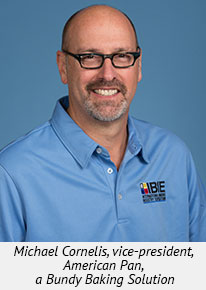 Michael Cornelis, vice-president, American Pan, a Bundy Baking Solution, IBIE past chair and IBIE International Task Force chair: In North America, Europe and the Middle East and North Africa regions, two significant trends in automated bun baking are emerging and require industry attention. They include a reduction in bun diameter due to the new market trend toward fresh, not frozen, burger beef, and growth of brioche-type buns on automated lines. Both trends are having a significant impact on bakers as they adopt new moulding and pan-cleaning technologies on their existing bun lines.
Michael Cornelis, vice-president, American Pan, a Bundy Baking Solution, IBIE past chair and IBIE International Task Force chair: In North America, Europe and the Middle East and North Africa regions, two significant trends in automated bun baking are emerging and require industry attention. They include a reduction in bun diameter due to the new market trend toward fresh, not frozen, burger beef, and growth of brioche-type buns on automated lines. Both trends are having a significant impact on bakers as they adopt new moulding and pan-cleaning technologies on their existing bun lines.
Every three years, IBIE shines the light on these and other industry innovations. More than 1,000 leading manufacturers and suppliers from across the world will be on hand, ready to provide the industry the complete spectrum of products and resources. IBIE’s 700,000-square-foot show floor will highlight everything the industry needs to increase efficiency, improve operations and boost bottom line.
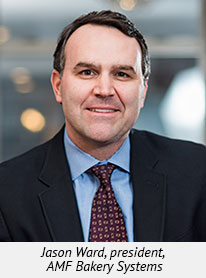 Jason Ward, president, AMF Bakery Systems: As bakers seek the most efficient operation for their production lines, better training tools and capabilities are key to enhancing employees’ knowledge and skills. Younger workers are entering the industry at a fast pace, a generation of experienced bakers are beginning to leave and retention of talent continues to be a huge challenge. Meanwhile, lines are becoming more automated and complex. An important priority for bakeries will be empowering their operators and maintenance staff with effective training and support, and next generation training technologies will be an important part of that effort. Improving operations is only possible if the people closest to the work know how to make it happen.
Jason Ward, president, AMF Bakery Systems: As bakers seek the most efficient operation for their production lines, better training tools and capabilities are key to enhancing employees’ knowledge and skills. Younger workers are entering the industry at a fast pace, a generation of experienced bakers are beginning to leave and retention of talent continues to be a huge challenge. Meanwhile, lines are becoming more automated and complex. An important priority for bakeries will be empowering their operators and maintenance staff with effective training and support, and next generation training technologies will be an important part of that effort. Improving operations is only possible if the people closest to the work know how to make it happen.
To address this operational challenge, AMF Bakery Systems continues to develop training tools to help bakers build higher performing teams through interactive training modules and skills assessment.
 Hans Herman Doude, vice-president of sales, EMEA, AMF Tromp: Aside from everyday challenges such as line efficiency, product variety and sanitation, it’s essential that bakery operators have a sense of ownership and pride when they’re on the production floor. Products created with passion, experience and heart, look and taste much better.
Hans Herman Doude, vice-president of sales, EMEA, AMF Tromp: Aside from everyday challenges such as line efficiency, product variety and sanitation, it’s essential that bakery operators have a sense of ownership and pride when they’re on the production floor. Products created with passion, experience and heart, look and taste much better.
While equipment solutions can solve the production requirements for any variety of baked products, it takes the ingenuity of a skilled baker and the passion of a skilled operations team to demand consistent product quality.
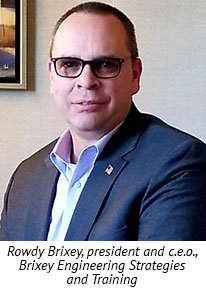 Rowdy Brixey, president and c.e.o., Brixey Engineering Strategies and Training: I believe we should always begin with people safety and taking the “hurt” out of our plants. Workers compensation will normally outpace downtime and waste combined. Operators should take a strong look at recordable injuries and near-misses.
Rowdy Brixey, president and c.e.o., Brixey Engineering Strategies and Training: I believe we should always begin with people safety and taking the “hurt” out of our plants. Workers compensation will normally outpace downtime and waste combined. Operators should take a strong look at recordable injuries and near-misses.
Second, bakers should consider projects that will improve product quality or consistency of quality. Items like more reliable refrigeration equipment or new makeup equipment for moulding are examples.
Third, bakeries have the most popular, but often elusive, R.O.I. projects. Reconsider the bottleneck for each line by product. Operators shouldn’t be surprised to find that one or two pieces of equipment throttle the entire line. Before making the final decision to invest in these assets, bakers should factor in the volume associated with these products to fully understand the rate of return. A 10 unit-per-minute (u.p.m.) increase for a long-run s.k.u. is a much better investment than a 20 u.p.m. increase that impacts one dough. By choosing wisely, operators can unleash trapped capacity without spending much capital.
Last, bakers should challenge their teams to think outside the box and consider ways to streamline processes internally. This can begin by measuring performance against perfection and then converting the percentages into cash or units. Units of product and dollars are a much better K.P.I. than percentages.
 Clay Miller, sales engineer at Burford Corp.: With all the changes within the Baking industry in 2018, it will be critical this next year to stay in front of our customers. Between restructuring, acquisitions and baby boomer retirements, bakeries will be relying on suppliers even more to educate them on what’s new and how we can help. Innovation will continue to drive decision making as it is no longer a hope but now a demand from our customers. Connectivity will also play a big role as we all make efforts to maximize the information available and use it to become more efficient. The status quo is no longer acceptable and that doesn’t just stop with the equipment. Customers are looking for the supplier companies to also fall in line with their sustainability efforts. Our plan for 2019 is to continue to be a partner with the baker from the beginning stages of R.&D. to the end of the equipment’s life, listening and learning along the way.
Clay Miller, sales engineer at Burford Corp.: With all the changes within the Baking industry in 2018, it will be critical this next year to stay in front of our customers. Between restructuring, acquisitions and baby boomer retirements, bakeries will be relying on suppliers even more to educate them on what’s new and how we can help. Innovation will continue to drive decision making as it is no longer a hope but now a demand from our customers. Connectivity will also play a big role as we all make efforts to maximize the information available and use it to become more efficient. The status quo is no longer acceptable and that doesn’t just stop with the equipment. Customers are looking for the supplier companies to also fall in line with their sustainability efforts. Our plan for 2019 is to continue to be a partner with the baker from the beginning stages of R.&D. to the end of the equipment’s life, listening and learning along the way.
 Dennis Gunnell, president, Formost Fuji Corp. and IBIE vice-chair: The baking industry, like so many industries, is facing operational challenges, including sanitation, sustainability, workforce development and product innovation.
Dennis Gunnell, president, Formost Fuji Corp. and IBIE vice-chair: The baking industry, like so many industries, is facing operational challenges, including sanitation, sustainability, workforce development and product innovation.
Sanitation concerns are a looming industry topic. Food safety and sanitation policies and procedures must be in place, reviewed often and followed rigorously to ensure bakeries are producing safe products for consumers. The industry is focused on developing and implementing rigors to maintain safety and ensure excellence.
Consumers have placed an increased emphasis on corporate citizenship and operational awareness. Identifying and implementing sustainable bakery processes and packaging is paramount in our efforts to reduce our carbon footprint. Choosing biodegradable over recyclable packaging is a growing movement in the industry, but with recent coverage of micro-plastics impeding our oceans, it’s clear there is more to be done.
With record numbers of skilled labor eligible for retirement and a shortage of trained trade-focused workers, the baking industry will face workforce challenges within the next 10 years. As an industry, it behooves us to explore creative ways to engage the next generation.
At the upcoming IBIE, scheduled Sept. 7-11, global industry leaders who are paving the way in sanitation, sustainability, workforce development and product innovation will be on display.
 Cesar Zelaya, bakery sales and technology manager, Handtmann, Inc.: As the baking industry experiences shortages in skilled labor, operators should invest in capital equipment to increase process automation. Bakers should consider automating processes that are often overlooked and bring additional costs to their facilities.
Cesar Zelaya, bakery sales and technology manager, Handtmann, Inc.: As the baking industry experiences shortages in skilled labor, operators should invest in capital equipment to increase process automation. Bakers should consider automating processes that are often overlooked and bring additional costs to their facilities.
Also, operators should focus on software technology that supports production management and traceability. The current market for modern bakeries is characterized by cost pressure and high demands for those in charge of the daily production. The software solution should monitor and analyze variables relevant to the operations in order to stay more competitive. Monitoring variables such as production numbers, downtime and shift documentation can keep costs under control and optimize outcomes.
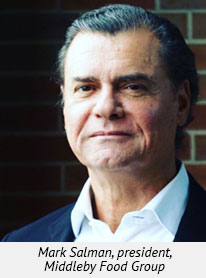 Mark Salman, president, Middleby Food Group: When it comes to financial controls, operators should measure their bakery business in cents, not dollars. At Middleby Bakery Group, we strive to provide the lowest cost of ownership to our customers. How do we do that? By thinking in inches, seconds and grams. Successful bakery operators should always think along these lines.
Mark Salman, president, Middleby Food Group: When it comes to financial controls, operators should measure their bakery business in cents, not dollars. At Middleby Bakery Group, we strive to provide the lowest cost of ownership to our customers. How do we do that? By thinking in inches, seconds and grams. Successful bakery operators should always think along these lines.
Additionally, bakers should try to adopt a minimalistic approach when developing recipes and processes. Let the industry get inspired by the success of the Tesla car where the approach is on so many fronts is clean, concise and minimalist. Look at the Model 3 interior and especially the dash. It’s a beautiful product delivered at less cost. Today’s consumer wants more with less. From the ingredient content to the packaging material, go back to basics and wow consumers with simple, genuine and clean label products.
Last but not least, bakers should think about innovation, a buzzword too often deployed as a marketing catchphrase. Instead, let us innovate with vigor, passion and truth.
This will be another momentous year for the industry.
 Nick Magistrelli, vice-president of sales, Rademaker: Bakery operations will continue to focus on removing waste from the plants by optimizing uptime.
Nick Magistrelli, vice-president of sales, Rademaker: Bakery operations will continue to focus on removing waste from the plants by optimizing uptime.
Considering the increasing issue with turnover in our industry, bakers need to identify key operating positions and retain employees that possess crucial experience and knowledge as well as find ways to recruit new talent into the industry.
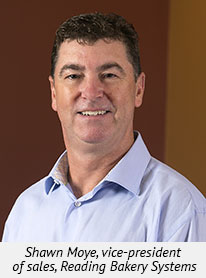 Shawn Moye, vice-president of sales, Reading Bakery Systems: Bakeries should be looking to increase automation to reduce labor requirements in an ever-shrinking manufacturing labor pool. Bakeries should consider more advanced mixing technologies that have the ability to automate processes, while increasing production efficiency, reducing labor and creating more consistent doughs. More consistent doughs improve machinability and the moisture profiles of the products through the entire baking process.
Shawn Moye, vice-president of sales, Reading Bakery Systems: Bakeries should be looking to increase automation to reduce labor requirements in an ever-shrinking manufacturing labor pool. Bakeries should consider more advanced mixing technologies that have the ability to automate processes, while increasing production efficiency, reducing labor and creating more consistent doughs. More consistent doughs improve machinability and the moisture profiles of the products through the entire baking process.
Food safety and employee safety must also be made a top priority for bakeries as they move into the future. To help bakeries easily comply to FSMA regulations and keep their products safe, operations should use tools that validate kill step and produce the documentation required by the F.D.A.
T im Cook, president and c.e.o., Shick Esteve: Technology, training and culture will have to be at the forefront of the evolution of bakery operations in 2019.
im Cook, president and c.e.o., Shick Esteve: Technology, training and culture will have to be at the forefront of the evolution of bakery operations in 2019.
As stated last year, there will be increased emphasis on technology that allows for system performance monitoring and data collection to assist bakers in making real time decisions that will maximize production efficiency.
Additionally, with ever increasing challenges to find and hire skilled workers, there will have to be an emphasis on training that allows for the development of skilled workers in the bakery. While it is difficult to find training programs that are both affordable and effective, programs like BEMA’s Train the Trainer program allow bakers to more effectively develop a skilled workforce through on the job training.
Finally, it is necessary for bakeries to focus on culture development within their operations. Creating empowering cultures that encourage responsibility, a free exchange of ideas and commitment to a central vision and strategy are absolutely critical in the battle for the acquisition and retention of talent in today’s workplace.




